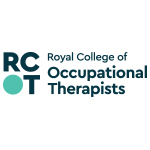This
degree apprenticeship programme is designed for engaging in
a work-based learning programme providing opportunities to develop understanding of occupational therapy and capitalise on
opportunities for applied learning within the context of employment.
Apprentices will combine academic studies with work-based reflection including their own
personal practices and behaviours. This is designed to equip apprentices for such
influential roles and support longer-term career aspirations of working as
a Registered Occupational Therapist.
Apprentices will be supported to learn and develop by a dedicated academic team who are all occupational
therapists registered with HCPC, including staff who are
Lecturer/practitioners, with clinical employment in local services. The team
have a wealth of clinical experience across a wide range of practice areas,
reflected in the variety of research interests and projects that members of the
team are involved with in relation to occupational therapy practice. They can
offer support in the practical application of skills and knowledge, emphasise a
person-centred approach within occupational therapy, and identify
opportunities for apprentices to interact with peers and staff. Apprentices will also have a specific Personal Tutor throughout the programme for support and guidance.
Recognising apprentices are a work-based learners, significant emphasis will be placed on
developing the academic learning skills and confidence.
This ongoing series of learning activities will begin
with an induction. This offers an opportunity to discuss
expectations; explore issues relating to the programme structure and delivery,
and to provide practical guidance in terms of use of library and support
services. Apprentices are actively encouraged to take advantage of the support
and services provided by the University’s Student Services, Skills
Plus resource and the Library Service, all of which will be introduced as
part of the induction event.
Extensive support is also accessible online as part of the University’s commitment to technology enhanced learning (TEL). This employs the use of the e-learning portal and social networking and collaborative learning tools. A central feature of the academic support available is the service provided by the university library at Northumbria. This service caters for all learning needs, has extensive access to electronic texts and tutorials that will directly support the development of academic skills aimed at developing critical thinking and analytical writing.
 Option for Placement Year
Option for Placement Year Option for Study Abroad
Option for Study Abroad


 Our Occupational Therapist Degree Apprenticeship is aimed at those
employed in occupational therapy support roles.
Our Occupational Therapist Degree Apprenticeship is aimed at those
employed in occupational therapy support roles.













